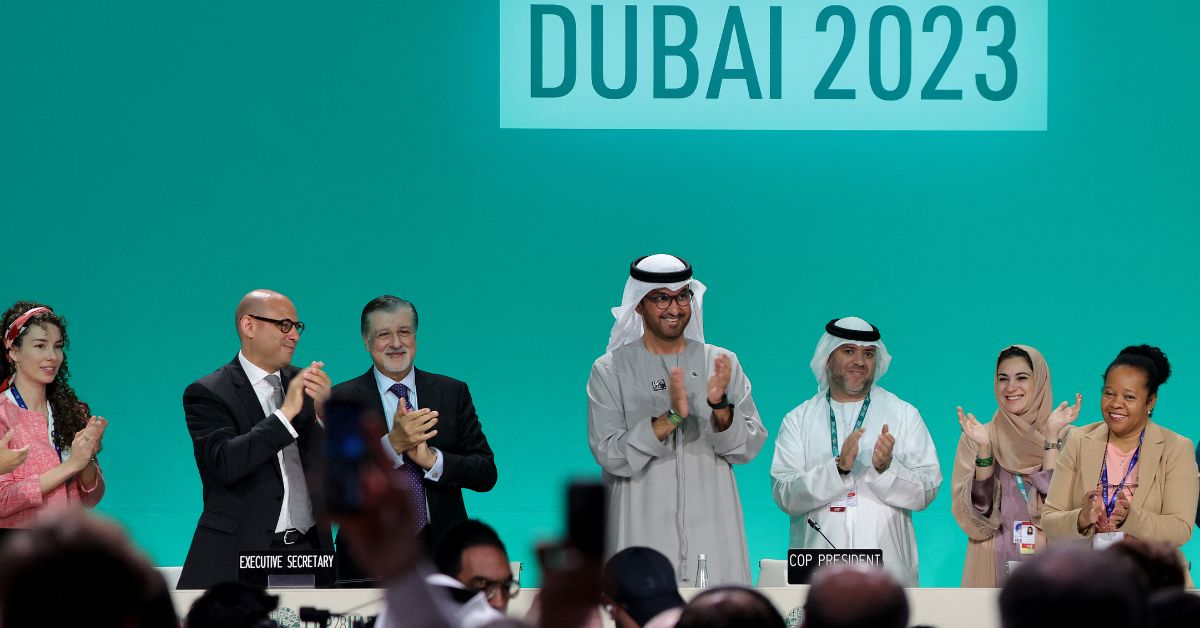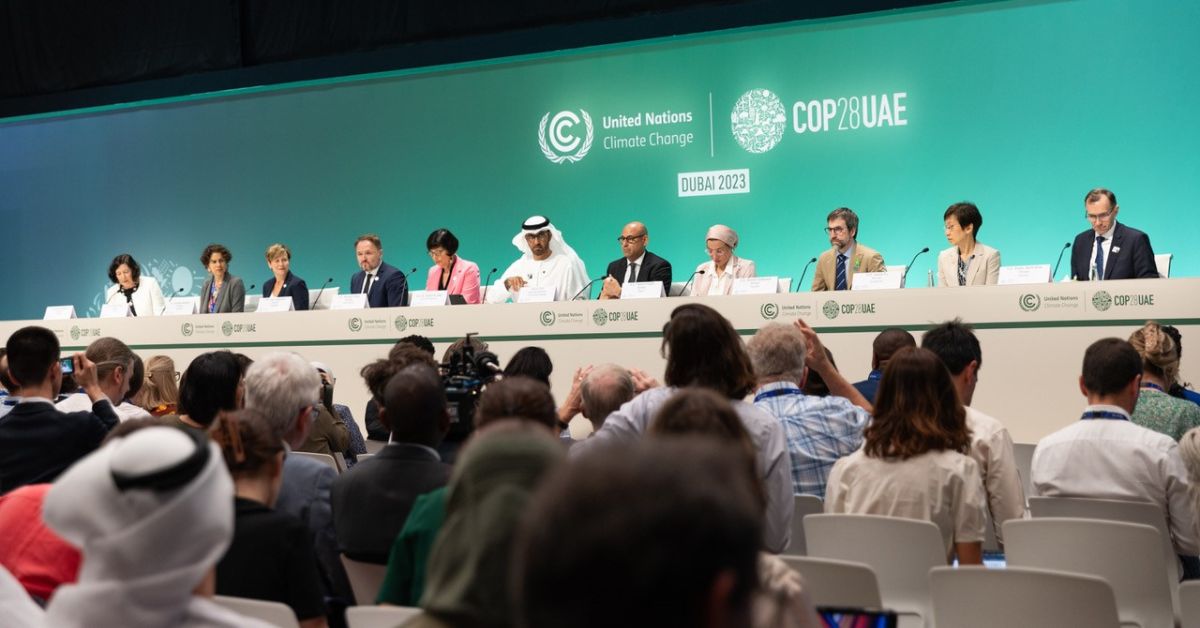Dubai, UAE — Nearly 200 nations gathered in Dubai on Wednesday endorsed a historic call for the world to shift away from fossil fuels, addressing the primary cause of climate change after years of inaction. However, countries most at risk said much more effort is needed.
After 13 days of negotiations and several sleepless nights in a country founded on oil wealth, the Emirati president of the UN-led COP28 summit signaled a global consensus with a gavel strike.
“You stepped up, showed flexibility, and prioritized the common interest over self-interest,” said COP28 president Sultan Al Jaber.
Describing the agreement as a “transformational change” in climate policy, Jaber spoke of the UAE’s diplomatic efforts: “We have helped restore faith and trust in multilateralism, demonstrating humanity’s ability to unite.”
"It's time to fully implement the #ParisAgreement." Simon Stiell, @UNFCCC Executive Secretary, emphasizes the urgency at #COP28. Let's accelerate our efforts for a #sustainable future.#ClimateAction @simonstiell @UNFCCC @COP28_UAE pic.twitter.com/OL1xRomsTh
— TRENDS (@mena_trends) December 13, 2023
Wopke Hoekstra, the EU’s climate chief, described the agreement as “long overdue”, noting it took nearly 30 years of climate meetings to “begin the end of fossil fuels.”
However, with the UN talks requiring consensus, Jaber skillfully crafted the text to include nations ranging from island countries fearing extinction due to rising sea levels to oil-rich Saudi Arabia, which insisted on continuing its petroleum exports.
The final agreement, strengthening language from an earlier draft criticized by environmentalists, advocates for “transitioning away from fossil fuels in energy systems in a just, orderly, and equitable manner”.
It emphasizes immediate action “in this critical decade” and reiterates the commitment to zero net greenhouse gas emissions by 2050, aiming to keep global warming below 1.5 degrees Celsius (2.7 degrees Fahrenheit) compared to pre-industrial levels.
COP28 At A Glance Mitigation Efforts and Nationally Determined Contributions: The COP28 conference emphasized aligning national contributions with long-term low greenhouse gas emission strategies. Delegates noted the capacity challenges faced by developing countries and urged parties to communicate their long-term strategies towards net zero emissions by mid-century, considering different national circumstances. Adaptation and Resilience Building: The conference highlighted the importance of global adaptation goals, including enhancing adaptive capacity, strengthening resilience, and reducing vulnerability to climate change. It recognized the adaptation planning and implementation efforts of various countries and stressed the need for accelerated financial support, especially for developing nations. Finance for Climate Action: A significant focus was on the growing financial gap for climate action in developing countries. The conference noted the urgent need for scaling up grant-based and concessional finance to support developing countries in their transition to low-emission, climate-resilient pathways. Technology Development and Transfer: The role of technology in climate action was underscored, with emphasis on developing and transferring climate-friendly technologies. The conference welcomed progress in supporting technology development and transfer, and highlighted the need to address gaps and barriers in technology adoption. Capacity Building and International Cooperation: The conference recognized the fundamental role of capacity building in effective climate action. It encouraged enhanced international cooperation, especially in areas of technology, adaptation, and mitigation, to support developing countries. Loss and Damage: Delegates acknowledged the increasing losses and damages due to climate change, emphasizing the need for enhanced action and support. The conference recognized national efforts in addressing climate change impacts and stressed the importance of international cooperation in this area. Response Measures and Economic Diversification: The COP28 conference recognized the need to maximize positive impacts and minimize negative socioeconomic impacts of climate response measures. It emphasized just transition, decent work, and economic diversification as critical components. Guidance and Way Forward: The conference reiterated the importance of implementing nationally determined contributions and the enhanced transparency framework. It encouraged parties to take into account various global stocktake outcomes in enhancing their climate actions.
The planet has already warmed by 1.2 degrees Celsius, and scientists suggest 2023 may have been the hottest year in 100,000 years, marked by escalating storms, droughts, and deadly wildfires worldwide.
Islanders Remain Alarmed
The negotiator from the Marshall Islands had cautioned that an earlier draft represented a “death warrant” for his nation, which lies just 2.1 meters (seven feet) above sea level.
While the small islands didn’t obstruct the Dubai agreement, a representative from Samoa critiqued the language as being too lenient. This was after alleging that the group hadn’t yet entered the room at Dubai’s expansive Expo City when Jaber announced consensus.
“We have made an incremental advance over business as usual, whereas what we truly need is an exponential leap in our actions,” expressed Samoan chief negotiator Anne Rasmussen on behalf of the island nations. Her remarks earned a standing ovation and polite applause from Jaber.

Brazil, set to host the climate talks in 2025 in the Amazon, emphasized that affluent nations must now fulfill another vital climate commitment — providing support to the most affected developing countries.
However, US climate envoy John Kerry noted that it’s impossible for any party to achieve everything in negotiations. He commended the agreement as a testament to a world beset by conflict being able to unite for the common good.
“I think everyone must acknowledge that this is a much more robust and clear call to action on 1.5 degrees than we’ve ever seen, accurately mirroring the scientific consensus,” Kerry stated.
You stepped up, showed flexibility, and prioritized the common interest over self-interest.
Sultan Al Jaber, COP28 President
A Saudi representative expressed “gratitude” for the UAE’s efforts, labeling the outcome as a “significant success”.
The text fell short of endorsing the summit’s calls for a “phase-out” of oil, gas, and coal, which cumulatively are responsible for about three-quarters of the emissions driving the planetary crisis.
Nonetheless, it significantly surpasses Jaber’s initial draft, which merely suggested nations “could” reduce the consumption and production of fossil fuels, among other alternatives.
Environmentalists almost universally viewed the agreement as progress, though many warned that much more work remains.
This agreement is long overdue…beginning the end of fossil fuels.
Wopke Hoekstra, EU Climate Chief
“We are finally acknowledging the obvious issue. The change is irreversible, and future COPs will continue to increasingly target fossil fuels,” stated Mohamed Adow, director of the Power Shift Africa think tank. He was referring to the annual UN climate meetings known as Conferences of the Parties.
“Some might have set their expectations too high for this meeting, but this outcome would have been unthinkable two years ago, especially at a COP summit in an oil-rich nation,” he added.
Greater Ambition, But with Loopholes
The agreement also more clearly defines the short-term objectives within the goal of eliminating net emissions by 2050.
It specifies a target to reduce greenhouse gas emissions by 43 percent by 2030, compared to 2019 levels.
We have made an incremental advance over business as usual, whereas what we truly need is an exponential leap in our actions.
Anne Rasmussen, Samoan Chief Negotiator
However, Jean Su from the Center for Biological Diversity acknowledged progress but pointed out “significant loopholes” concerning fossil fuels.
The agreement focuses solely on fossil fuel use in energy, excluding industrial sectors like plastics and fertilizer production.
She also expressed concern over the acknowledgment of “transitional fuels”, which she interpreted as a subtle nod to natural gas producers and other fossil fuel industries, like those in the United States, citing energy security. The deal endorses a reduction in “unabated” coal power, thereby maintaining a role for this heavily criticized energy source if carbon capture technology is utilized, a method many environmentalists dismiss as unproven.
This is a much more robust and clear call to action on 1.5 degrees than we’ve ever seen, accurately mirroring the scientific consensus.
John Kerry, US Climate Envoy
The COP28 presidency scheduled a plenary session at 9:30 am (0530 GMT) in the hope of the text receiving consensus approval from nearly 200 nations.
Stephen Cornelius of the conservation group WWF called the new draft a “sorely needed improvement.” “If this text is agreed upon by countries, it would represent a significant moment,” he said.
Stronger calls
The two-week conference in Dubai was supposed to end Tuesday but went into overtime as nations struggled to agree on what to do with fossil fuels, the main culprits of the climate crisis.
We are finally acknowledging the obvious issue. The change is irreversible, and future COPs will continue to increasingly target fossil fuels.
Mohamed Adow, Director of Power Shift Africa Think Tank
Al Jaber, who heads the United Arab Emirates’ national oil company, had proposed a draft on Monday that was roundly rejected as too weak for merely suggesting that nations “could” reduce the consumption and production of fossil fuels, among other options.
The new draft explicitly “calls on” all nations to contribute through a series of actions, including transitioning from fossil fuels.
While not using the term “phase-out” for fossil fuels, it endorses work towards a phase-down of “unabated coal power” — meaning that coal with carbon capture technology to reduce emissions, criticized by many environmentalists as unproven, could continue.
It also calls for “phasing out inefficient fossil fuel subsidies that do not address energy poverty or just transitions, as soon as possible.”
Jaber held talks deep into the night with negotiators from across the world in his office in the sprawling Expo City complex.
European officials had signaled that they were willing to find compromise language, while US climate envoy John Kerry said “progress” was made in the talks.
‘Super-majority’ vs. OPEC Nations
The 2015 Paris summit endorsed checking warming at 1.5 degrees Celsius — a goal repeated in the latest draft, but which critics say is virtually impossible without serious efforts to curb oil, gas, and coal.
More than 130 countries from Europe, the Pacific, the Caribbean, and the Americas, including Brazil and the United States, joined forces to call for an exit from oil, gas, and coal.
Hoekstra had earlier said a “super-majority” of the nearly 200 countries in the talks wanted stronger action on fossil fuels.
Saudi Arabia, Kuwait, and Iraq have been the most vocal opponents of a phase-out, and the OPEC oil cartel had urged its members to block any deal targeting fossil fuels.
At an energy conference in Qatar on Tuesday, Kuwaiti oil minister Saad Hamad Nasser Al Barrak said a phase-out was a “racist and colonial” proposal that would wreck economies in the region. Iraq’s oil minister, Hayyan Abdul Ghani Al Sawad, said: “Fossil fuels will remain the major source of energy in the whole world.”
(With agency inputs)








